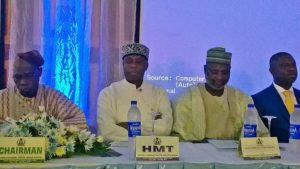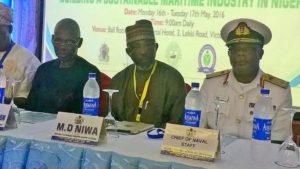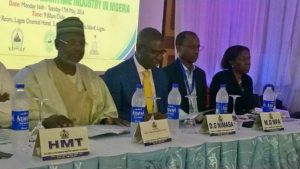Former President, Olusegun Obasanjo has advised the Federal government to avoid the temptation re-establishing another National Shipping Line for the country with government fund as it will not be sustainable in the long run.
Obasanjo who gave this advice Monday during the opening session of the ongoing Maritime Stakeholders’ Conference with the theme,” Building a Sustainable Maritime Industry in Nigeria”, holding in Lagos recalled that Nigeria had a horrible experience running the liquidated Nigeria National Shipping Lines (NNSL) as well as the liquidated Nigerian Airways adding that while the plans to re-establish the National Shipping was a laudable one, the private sector should indeed take the lead in this regard.
According to him, I am delighted to hear that plans are ongoing for the re-establishment of a National Shipping Line. As it stands today, the Nigerian maritime sector is dominated by foreign vessels and the graduands of MAN Oron cannot get sea time training because of the lack of a national carrier. This is a mockery of the country’s status as the largest economy in Africa and as the maritime hub for West and Central Africa. The implication of this on the national economy is huge capital flight and low capacity utilization with the attendant loss of revenue for the country.
“Much as the Shipping Line is a laudable project, we must be mindful and ready to deal with the dynamics of international conspiracy and gang-ups, declining capacity in the nation’s seafarers’ base as well as availability of cargo without which ships can hardly be sustained. If we are to build a sustainable maritime industry in Nigeria then the Public Private partnership, in my view, is a credible option for building the necessary collaboration that will enable the country take advantage of its enormous potentials in the maritime industry”.
Obasanjo who was also the Chairman of the opening session at the conference recalled that in 1979 when he was the Head of State, government built 19 brand new ships for the country not counting the 5 ships that were in the fleet before then bringing the total number of ships in the nation’s fleet to 24 however regretted that 20 years after, when he was coming back as the Nigeria’s elected president in 1999, the 24 ships were all gone.
The former President attributed the mismanagement of the NNSL to lack of commitment, lack of Professionalism and corruption on the part of the management of the Shipping Line saying that there was a case of 2 ship missing for 2 years only to be discovered years later in the hand of a high ranking Military officer who took it away from the shores of the country and was doing business across the globe with it without accounting to the government.
He however tipped Nigeria as being lucky as it was not a landlocked country and was blessed with 3000 sq km coastlines and inland waterways that could accelerate socio-economic activities create job and generate revenue for government adding that these resources when properly harnessed could put Nigeria in a pole position as a true economic giant both regionally and globally.
He pleaded with the government to pay a closer attention to effective implementation of the Cabotage Act saying that the Cabotage Act provided for Cabotage Vessel Financing Fund (CVFF) specifically to provide opportunities for Nigerians to access loans for the purpose of acquiring ships, thereby increasing the tonnage capacity of Nigerian operators.
“It is necessary to re-examine the Cabotage Act and the implementation guidelines with a view to enhancing indigenous participation in ship building and ship acquisition. Nigeria cannot hope to become a regional and global maritime power without first been able to dominate its inland maritime trade”, he said.
While admitting that most advanced economies of the world were those that have highly developed maritime industries and greater percentage participation in international trade, he however requested the government to work out strategies that would not only make the Nigerian ports more attractive and preferable by many shippers and shipping companies but also come up with factors that would prevent forthwith the craze for shipping and clearing of cargo through the neighbouring ports of Cotonou, Lome and Ghana saying that these constitute serious drains on Nigeria’s foreign exchange earnings in the maritime sector.
Also speaking, the Minister of Transportation, Rt. Hon. Chibuike Rotimi Amaechi described the maritime industry as central to the socio-economic development of any nation as over 90% of the global trade was expedited through the sea thus making the maritime industry a major foreign exchange earner for countries with maritime resources like Nigeria.
Amaechi recalled that the global fall in oil prices was a crucial pointer to the fact that Nigeria urgently needed to diversify her economy away from oil to manufacturing, agriculture, mining and export where the maritime sector was a the major facilitator as its services were demand driven.
“There is no gainsaying the fact that an efficient maritime industry comes with effective regulatory and omnibus services such as Flag-state and Port state activities, Port Management and Administration, freight forwarding and other ancillary services like inter-modalism, ship building and repairs, and manpower development amongst others which indeed portends massive employment of direct and indirect labour. The maritime industry also offers the best opportunity to productively engage our ever increasing work-force and to stimulate economic growth and national development.
“Again, the Nigerian maritime industry has the potential to generate huge revenues for government. We are however bothered by the lack of adequate capacity level and revenue leakages that have characterized this strategic sector over the years. This is either caused by corrupt practices, managerial inefficiency and a slow or non response to industry demands as the case may be. For instance, in the present globalized world of port competitiveness, port customers required quick, reliable and flexible services yet at minimum costs. Although the port reform regime in Nigeria can be said to have recorded some level of success, we are yet to achieve the above objectives in our present port operations”, he said.
On his part, the Minister of State Aviation, Sen. Hadi Sirika stated that the conference was holding at a time when there was a dire need to take a critical look at the maritime industry with a view to identifying the challenges and opportunities inherent therein and to proffer solutions on the way forward.
Sirika observed that the nation’s over reliance on the oil economy had hindered investment in other critical sectors of the economy like mining, manufacturing and agriculture thereby reducing the country with its great potentials to a beggarly nation aptly described by many as a sleeping giant.
“This conference is therefore an opportunity to bring together experts, professionals and other industry players who will spend the next two days to brainstorm on the issues which are germane and strategic enough to bring about resolutions and recommendations for urgent consideration”, Sirika stated.
He therefore encouraged the participants to the conference to take advantage of the opportunity and examine issues arising from their interactions so that they could collectively articulate their thoughts and inputs to the report that would emanate from the conference for the attention of the Federal Government.
Furthermore, the Chairman Senate Committee on Marine Transport, Senator Ahmed Sani Yerima promised that the National Assembly would look at the outcome of the conference and ensure that it would do all it needed to do to support the achievement the nation’s dream for the sector through legislations so as to get the nation’s maritime sector in the right pedestal.
Send your news, press releases/articles to info@primetimereporters.com. Also, follow us on Twitter @reportersinfo and on Facebook at facebook.com/primetimereporters or call the editor on 07030661526.




